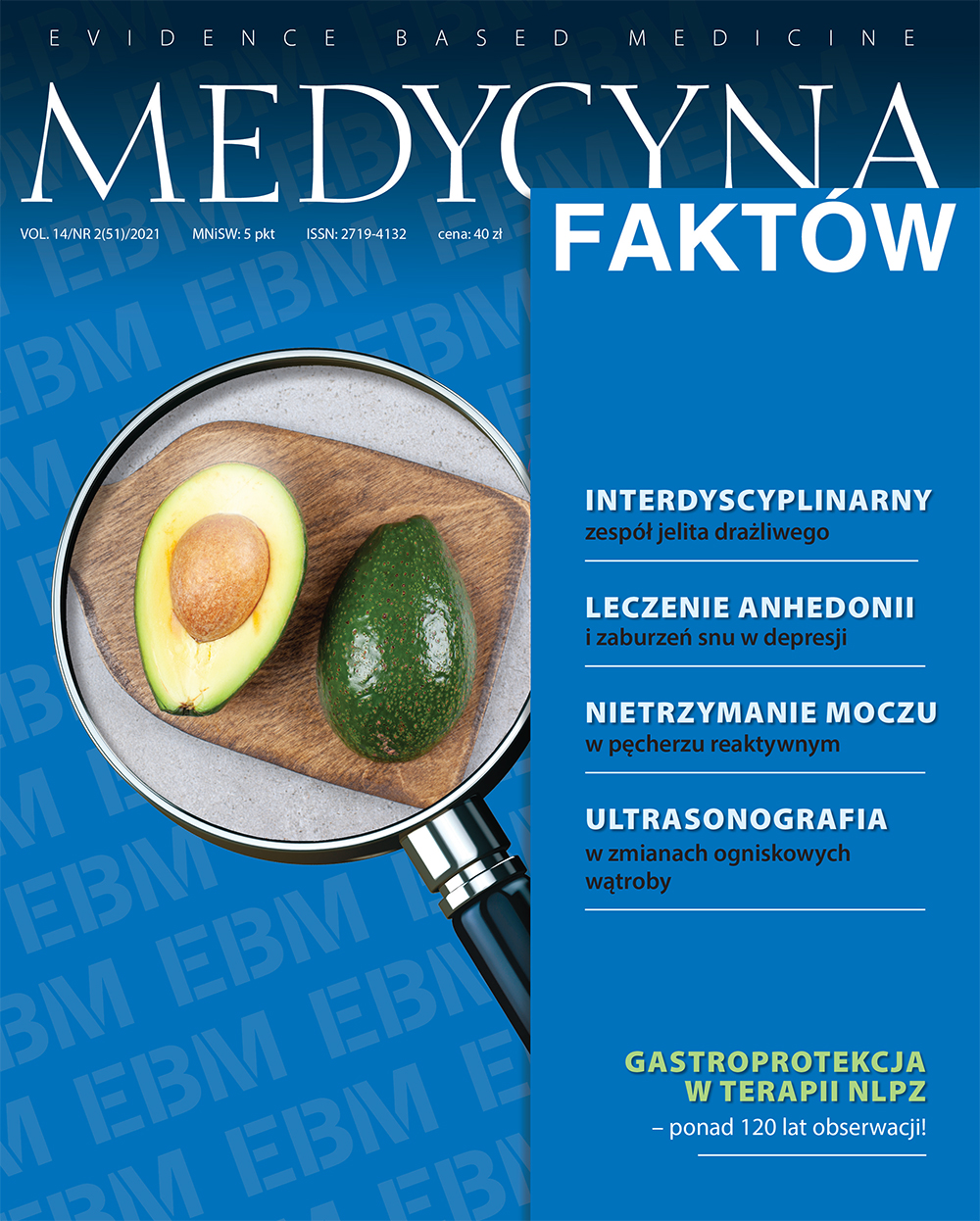Quetiapine. A collection of useful information for the clinician Review article
Main Article Content
Abstract
Quetiapine is an antipsychotic drug with proven efficacy in the treatment of schizophrenia and bipolar disorder as well as recurrent depression and generalized anxiety disorder. There is also evidence of the efficacy of quetiapine in other disorders dominated by affective and/or anxiety symptoms, for which treatment is not registered in Poland. The paper presents information useful in medical practice and presents descriptions of use cases.
Article Details
How to Cite
Siwek , M. (2021). Quetiapine. A collection of useful information for the clinician. Medycyna Faktow (J EBM), 14(2(51), 182-185. https://doi.org/10.24292/01.MF.0221.7
Issue
Section
Articles
Copyright © by Medical Education. All rights reserved.
References
1. Siwek M. Właściwości farmakokinetyczne i farmakodynamiczne kwetiapiny. In: Siwek M, Wierzbiński P. Kompendium wiedzy o kwetiapinie i nie tylko. Vol II. Wydawnictwo Lekarskie PZWL, Warszawa 2020.
2. Siwek M, Krupa AJ. Arypiprazol, olanzapina i kwetiapina w leczeniu schizofrenii i choroby afektywnej dwubiegunowej. Neuropsychiatria. Przegląd kliniczny. 2020; 12(3).
3. Langstrom B, Wiesel F, Lindstrom L. D2 and 5HT 2A receptor occupancy of different doses of quetiapine in schizophrenia: a PET study quetiapine in schizophrenia: a PET study. Eur Neuropsychopharmacol. 2001; 11: 105-10.
4. Lee KU, Jeon YW, Lee HK et al. Efficacy and safety of quetiapine for depressive symptoms in patients with schizophrenia. Hum Psychopharmacol. 2009; 24(6): 447-52.
5. Kasper S. Quetiapine is effective against anxiety and depressive symptoms in long-term treatment of patients with schizophrenia. Depress Anxiety. 2004; 20: 44-7.
6. Calabrese JR, Keck Jr PE, Macfadden W et al. A randomized, double-blind, placebo-controlled trial of quetiapine in the treatment of bipolar I or II depression. Am J Psychiatry. 2005; 162: 1351-60.
7. Young AH, Calabrese JR, Gustafsson U et al. Quetiapine monotherapy in bipolar II depression: Combined data from four large, randomized studies. Int J Bipolar Disord. 2013; 1: 10.
8. Gustafsson U, Fajutrao L. Effect of quetiapine on functioning and quality of life in bipolar depression. Eur Psychiatry. 2011; 26: 1935.
9. Cookson J, Keck PE, Ketter TA et al. Number needed to treat and time to response/remission for quetiapine monotherapy efficacy in acute bipolar depression: evidence from a large, randomized, placebo-controlled study. Int Clin Psychopharmacol. 2007; 22(2): 93-100.
10. Young AH, McElroy SL, Bauer M et al. A double-blind, placebo-controlled study of quetiapine and lithium monotherapy in adults in the acute phase of bipolar depression (EMBOLDEN I). J Clin Psychiatry. 2010; 71(2): 150-62.
11. McElroy SL, Weisler RH, Chang W et al. A double-blind, placebo-controlled study of quetiapine and paroxetine as monotherapy in adults with bipolar depression (EMBOLDEN II). J Clin Psychiatry. 2010; 71(2): 163-74.
12. Ketter TA, Miller S, Dell’Osso B et al. Treatment of bipolar disorder: Review of evidence regarding quetiapine and lithium. J Affect Disord. 2016; 191: 256-73.
13. Siwek M. Interakcje kwetiapiny z innymi lekami. In: Siwek M, Wierzbiński P. Kompendium wiedzy o kwetiapinie i nie tylko. Vol II. Wydawnictwo Lekarskie PZWL, Warszawa 2020.
14. Woroń J, Siwek M, Wasik A. Interakcje leków w psychiatrii. AsteriaMed, Gdańsk 2019.
15. Bazire S. Psychotropic drug directory 2020/21. Lloyd-Reinhold Publications, London 2020.
2. Siwek M, Krupa AJ. Arypiprazol, olanzapina i kwetiapina w leczeniu schizofrenii i choroby afektywnej dwubiegunowej. Neuropsychiatria. Przegląd kliniczny. 2020; 12(3).
3. Langstrom B, Wiesel F, Lindstrom L. D2 and 5HT 2A receptor occupancy of different doses of quetiapine in schizophrenia: a PET study quetiapine in schizophrenia: a PET study. Eur Neuropsychopharmacol. 2001; 11: 105-10.
4. Lee KU, Jeon YW, Lee HK et al. Efficacy and safety of quetiapine for depressive symptoms in patients with schizophrenia. Hum Psychopharmacol. 2009; 24(6): 447-52.
5. Kasper S. Quetiapine is effective against anxiety and depressive symptoms in long-term treatment of patients with schizophrenia. Depress Anxiety. 2004; 20: 44-7.
6. Calabrese JR, Keck Jr PE, Macfadden W et al. A randomized, double-blind, placebo-controlled trial of quetiapine in the treatment of bipolar I or II depression. Am J Psychiatry. 2005; 162: 1351-60.
7. Young AH, Calabrese JR, Gustafsson U et al. Quetiapine monotherapy in bipolar II depression: Combined data from four large, randomized studies. Int J Bipolar Disord. 2013; 1: 10.
8. Gustafsson U, Fajutrao L. Effect of quetiapine on functioning and quality of life in bipolar depression. Eur Psychiatry. 2011; 26: 1935.
9. Cookson J, Keck PE, Ketter TA et al. Number needed to treat and time to response/remission for quetiapine monotherapy efficacy in acute bipolar depression: evidence from a large, randomized, placebo-controlled study. Int Clin Psychopharmacol. 2007; 22(2): 93-100.
10. Young AH, McElroy SL, Bauer M et al. A double-blind, placebo-controlled study of quetiapine and lithium monotherapy in adults in the acute phase of bipolar depression (EMBOLDEN I). J Clin Psychiatry. 2010; 71(2): 150-62.
11. McElroy SL, Weisler RH, Chang W et al. A double-blind, placebo-controlled study of quetiapine and paroxetine as monotherapy in adults with bipolar depression (EMBOLDEN II). J Clin Psychiatry. 2010; 71(2): 163-74.
12. Ketter TA, Miller S, Dell’Osso B et al. Treatment of bipolar disorder: Review of evidence regarding quetiapine and lithium. J Affect Disord. 2016; 191: 256-73.
13. Siwek M. Interakcje kwetiapiny z innymi lekami. In: Siwek M, Wierzbiński P. Kompendium wiedzy o kwetiapinie i nie tylko. Vol II. Wydawnictwo Lekarskie PZWL, Warszawa 2020.
14. Woroń J, Siwek M, Wasik A. Interakcje leków w psychiatrii. AsteriaMed, Gdańsk 2019.
15. Bazire S. Psychotropic drug directory 2020/21. Lloyd-Reinhold Publications, London 2020.

